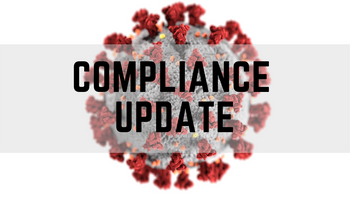Department of Labor Revises Families First Coronavirus Act Regarding Paid Sick Leave and Expanded Family & Medical Leave Regulations
Published September 18, 2020
On September 11, 2020, the U.S. Department of Labor’s Wage and Hour Division (WHD) posted revisions to regulations that implemented the paid sick leave and expanded family and medical leave provisions of the Families First Coronavirus Response Act (FFCRA). The revisions made by the new rule clarify workers’ rights and employers’ responsibilities under the FFCRA’s paid leave provisions, in light of the U.S. District Court for the Southern District of New York’s August 3, 2020 decision that found portions of the regulations invalid, and are effective September 16, 2020 when published in the Federal Register.
The revisions do the following:
- Explain the requirement that employees may take FFCRA leave only if work would otherwise be available to them.
- Explain the requirement that an employee must have employer approval to take FFCRA leave intermittently.
- Revise the definition of “health care provider” to include only employees who meet the definition of that term under the Family and Medical Leave Act regulations or who are employed to provide diagnostic services, preventative services, treatment services, or other services that are integrated with and necessary to the provision of patient care which, if not provided, would adversely impact patient care.
- Clarify that employees must provide required documentation supporting their need for FFCRA leave to their employers as soon as practicable (rather than making them provide documentation before approving their leave).
- Correct an inconsistency regarding when employees may be required to provide notice of a need to take expanded family and medical leave to their employers.
Frequently Asked Questions:
1. Can an organization ask an employee whether any of their family members have COVID-19 or symptoms associated with COVID-19?- NO! This violates the Genetic Information Nondiscrimination Act (GINA), which prohibits employers from asking employees medical questions about family members.
- GINA, however, does not prohibit an employer from asking employees whether they have had contact with anyone diagnosed with COVID-19 or who may have symptoms associated with the disease. So be very careful how you ask your questions!
2. When employees return to work from a COVID-related illness, does the ADA allow employers to require a doctor's note certifying fitness for duty?
- Yes. Such inquiries are permitted under the ADA because (1) they are not considered to disability-related and (2) because the pandemic is so severe, employers are justified under the ADA standards for disability-related inquiries of employees.
- As a practical matter, however, doctors and other health care professionals may be too busy during and immediately after the pandemic to provide fitness-for-duty documentation. Therefore, new approaches may be necessary, such as reliance on local clinics to provide a form, a stamp, or an e-mail to certify that an individual does not have COVID-19 and may resume normal work activities.
3. What actions can a company take if an employee is exhibiting flu-like symptoms but refuses to leave the workplace?
- You should first take a collaborate approach. Remind the employee that you are asking them to leave. Try to make them understand the reasons why their departure is necessary to maintain the health and safety of the entire workplace. If there are benefits available such as paid sick leave, use of accrued vacation, or something else that may appease them, you should explain these benefits and how the employee can utilize them.
- If the employee still refuses to leave the workplace, you can consider:
- Explaining to them that they are now trespassing on private property and if they do not leave you will be forced to call law enforcement to escort them off the premises.
- Disciplining or even terminating the employee for insubordination. Termination of the employee should be a last resort. If the employee has a legal contract with you, then you may not be able to terminate them after all! Given the current climate, you will need to also consider public perception related to taking overly strong adverse action against an employee expressing concerns or apprehension related to the coronavirus.
4. Is COVID-19 a recordable illness for purposes of OSHA Logs?
- The Occupational Safety & Health Administration (OSHA) has published guidance on this issue. Record keeping requirements under OSHA mandates covered employers record certain work-related injuries and illnesses on their OSHA 300 log. Therefore, employers must record instances of workers who contract COVID-19 if the worker contracts the virus while on the job. The illness is not recordable if an employee was exposed to the virus while off the clock.
The information contained herein is provided for informational purposes only and should not be construed as legal advice. You should not act or refrain from acting on the basis of any content within this document without seeking the professional guidance from our Sr. HR Consultants or obtaining legal advice from your attorney.
